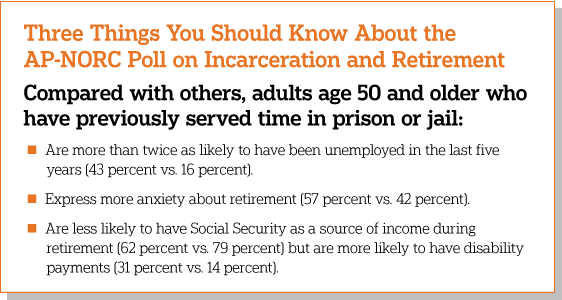
Incarceration has a significant and lasting impact on older Americans’ work and retirement experiences, according to a new study conducted by The Associated Press-NORC Center for Public Affairs Research.
Americans age 50 and older who report that they have been incarcerated at some point in their lives are more likely to have experienced unemployment in the recent past, to express anxiety about several aspects of retirement, and to have fewer sources of income for retirement than those who have not. In terms of retirement preparation, older Americans who have been incarcerated are four times more likely to say they don’t have any sources of retirement income at all.
In recent years, The AP-NORC Center has undertaken a series of major studies to explore the work habits of older Americans and the changing notion of retirement in the United States. The 2016 study uncovered inequalities in older Americans’ attitudes and behaviors related to retirement, based on income level. Incarceration in the United States is highly correlated with socioeconomic status, with Americans who have lower levels of educational attainment1 and racial minorities2 having a far greater likelihood of being imprisoned. According to the Bureau of Justice Statistics, 2.1 million people were incarcerated in the United States in 2015.3 This new analysis of the 2017 AP-NORC survey provides a rare glimpse into the lives of the previously incarcerated and reveals that incarceration has lasting impacts on employment opportunities and retirement outlook for older Americans.
The survey also reveals that incarceration affects the retirement outlook of older Americans who have not themselves been imprisoned but who have immediate family members who have served time in prison or jail. These older Americans with indirect experience with the penal system express more anxiety about retirement.
The AP-NORC Center, with funding from the Alfred P. Sloan Foundation, conducted 1,683 interviews with a nationally representative sample of adults age 50 and older using the AmeriSpeak® Panel. The sample includes 157 older Americans who have been incarcerated. Findings from the survey offer a rare look at the effects of incarceration on older Americans’ work life and retirement outlook.

- Western, B. 2006. Punishment and Inequality in America. New York: Russell Sage Foundation.
- Alexander, M. 2012. The New Jim Crow: Mass Incarceration in the Age of Colorblindness. New York: New Press.
- Bureau of Justice Statistics. 29 December 2016. “U.S. Correctional Population at Lowest Level since 2002.” Press release. https://www.bjs.gov/content/pub/press/cpus15pr.cfm


